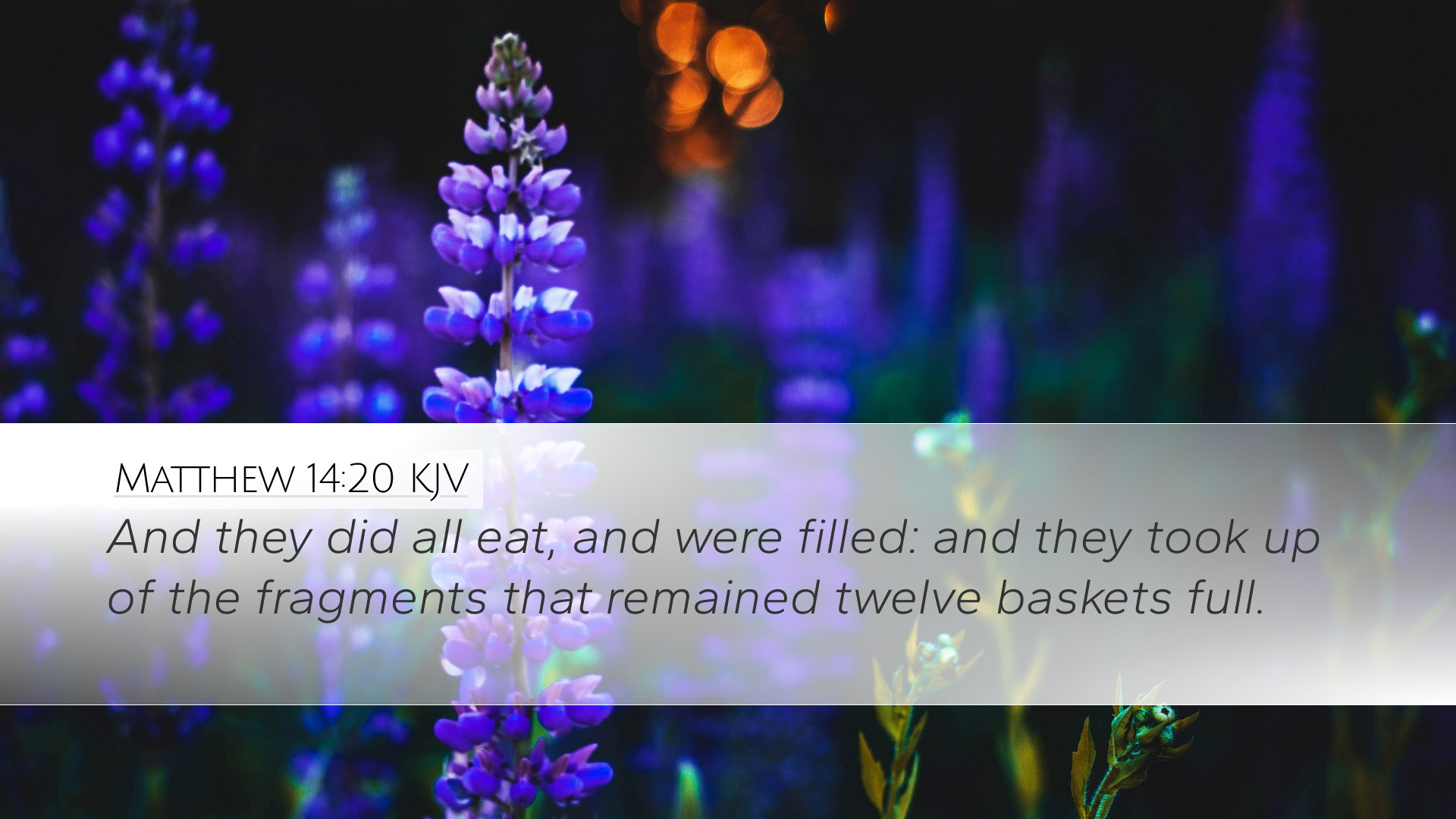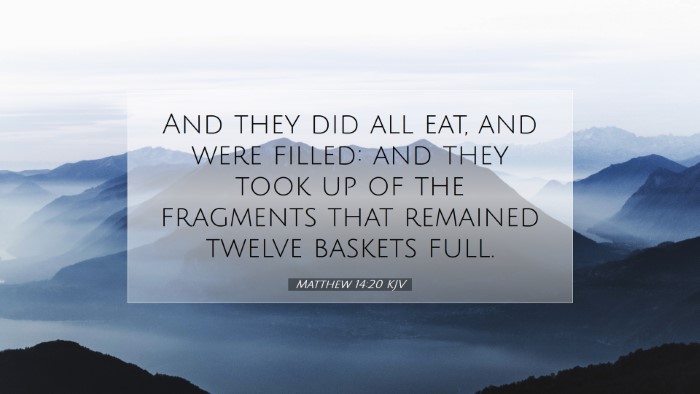Commentary on Matthew 14:20
Matthew 14:20 states: "And they did all eat, and were filled: and they took up of the fragments that remained twelve baskets full." This verse comes from a pivotal moment in the Gospel that illustrates the miraculous provision of Christ and serves as a powerful testament to His divine authority and compassion.
Contextual Overview
This passage is situated within the account of the feeding of the five thousand, a significant miracle that underscores Jesus' care for the physical and spiritual needs of the people. Prior to this, we see Jesus retreating to a solitary place to mourn the death of John the Baptist but is followed by a multitude who are eager to hear His teachings and receive healing.
Analysis of the Text
The phrase "And they did all eat, and were filled" signifies the completeness of their satisfaction. The miracle not only provided sustenance but also revealed Jesus as the Bread of Life, fulfilling their immediate needs while pointing to deeper spiritual truths.
Commentary Highlights
-
Matthew Henry: Henry emphasizes the compassionate nature of Jesus in this miracle. He notes that Christ's provision of food to the multitude not only demonstrates His power but also His concern for the well-being of the people. He draws attention to the idea that Jesus invites us to bring our needs to Him and He provides abundantly, as seen in the remains of twelve baskets, symbolizing the sufficiency of His grace.
-
Albert Barnes: Barnes provides insights into the miracle as an example of God's abundant provision. He highlights that the number of baskets left over indicates that Jesus' power is not limited, and what He offers is more than sufficient. He interprets the twelve baskets as representative of the twelve tribes of Israel, suggesting a deeper meaning of divine blessing and completeness of God’s covenant people.
-
Adam Clarke: Clarke elaborates on the significance of the fragments being gathered. He suggests that each basket represents the care of Christ for every individual, emphasizing that nothing is wasted in God’s economy. This abundance serves as an assurance of God’s provision and care for His followers, reinforcing the idea that Christ is both able and willing to meet the needs of His people.
Spiritual Significance
The miracle of feeding the five thousand, culminating in the filling of the twelve baskets, communicates several spiritual truths:
-
Jesus as the Provider: The feeding signifies Jesus’ role as the provider who does not just meet needs but exceeds them. In context, it not only addresses physical hunger but implies a deeper spiritual nourishment offered through His teachings and presence.
-
Community and Sharing: The act of distributing food emphasizes the importance of community and the sharing of resources. The disciples participated in the miracle, conveying the message that believers are called to be instruments of His provision.
-
Faith and Abundance: The gathering of fragments underscores the importance of faith in Christ's sufficiency. It reassures us that even what seems meager in our hands can become an abundance when blessed by Christ.
Theological Implications
This passage invites contemplation of several key theological implications:
-
Divine Sovereignty: The miracle serves as a testament to God's sovereignty over creation. In providing food from five loaves and two fish, Jesus demonstrates that God has authority over natural limits.
-
Grace Abound: The twelve baskets remaining symbolize the abundant grace available through Christ. They remind believers that God’s blessings overflow and provide not just for the present moment, but for the journey ahead.
-
Community of Believers: The assembly of people who were fed can represent the Church. Just as Christ provided for the physical needs of the crowd, His Church is called to care for daily needs, reflecting His love and compassion.
Applications for Today
In a contemporary context, Matthew 14:20 challenges us as followers of Christ to:
-
Trust in God’s Provision: Believers are encouraged to trust that God will provide for their needs, sustaining them in times of scarcity.
-
Participate in the Work of God: Just as the disciples were active participants in the miracle, Christians today are called to be proactive in sharing resources, love, and support within their communities.
-
Cultivating Gratitude: Recognizing God’s abundant provision in our lives cultivates a spirit of gratitude, compelling us to share those blessings with others.
Conclusion
Matthew 14:20 is not merely an account of a miracle but a profound declaration of who Jesus is—a compassionate provider, a miracle worker, and the manifestation of God's abundant grace. It beckons both the believer and the skeptic to examine their understanding of God’s nature and to trust in His ability to meet every need in His perfect timing.


